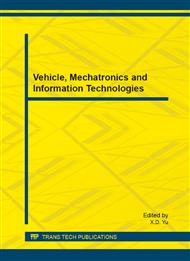p.450
p.455
p.459
p.463
p.467
p.472
p.476
p.480
p.485
The Instantaneous Optimal Control Strategy of Parallel Hybrid Loader
Abstract:
In this paper, the instantaneous optimal control strategy of parallel hybrid loader is presented. The aim is to achieve the real time optimal allocation of internal combustion engine (ICE) torque and motor torque in any driving cycle for loader. Thus, all combinations of the ICE torque and the motor torque is determined in any demand torque. Then integrated instantaneous fuel consumption (IIFC) is calculated as a target function, by establishing the equivalent relationship between the electric energy consumption of battery and the fuel consumption, which is converted to the electric energy. When the minimum integrated instantaneous fuel consumption is found, the instantaneous optimal allocation of ICE torque and the motor torque is achieved. Finally in order to verify the functionality of the control strategy, the vehicle and the control algorithm co-simulation model is built on AMESim and Matlab/Simulink platforms. The simulation results show that the strategy is able to improve the fuel economy by more than 10% while ensuring the vehicle power performance.
Info:
Periodical:
Pages:
467-471
Citation:
Online since:
August 2013
Authors:
Price:
Сopyright:
© 2013 Trans Tech Publications Ltd. All Rights Reserved
Share:
Citation:


